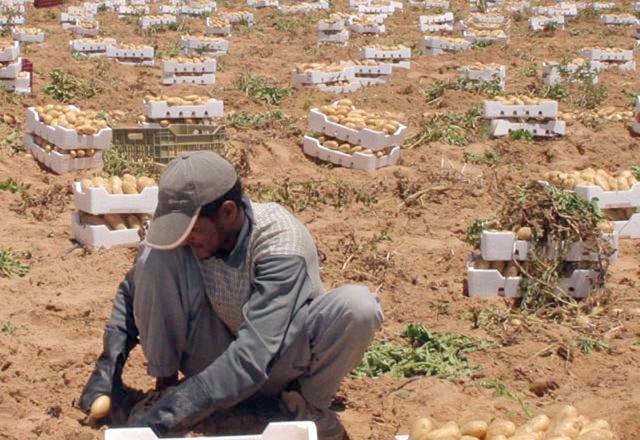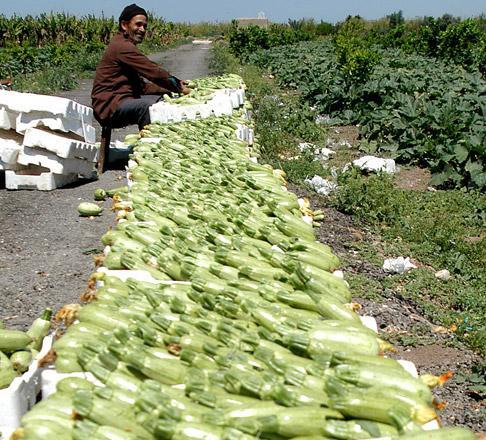You are here
Jordanian workforce faces ‘immense’ labour market challenges — report
By Batool Ghaith - Apr 30,2022 - Last updated at May 01,2022

The Jordan Labour Watch in its report warned of unregulated work in the agricultural sector (File photo)
AMMAN — A recent report by the Jordan Labour Watch shows that Jordanian workers face “immense challenges “in the labour market, as the majority suffer from “inappropriate” working conditions.
According to the report, titled “Jordan workers situation”, labourers suffer from a lack of job opportunities, low wages, unorganised work, the absence of security and job stability, and a wide range of violations in labour rights as dictated in the Jordanian labour law.
The report assessed labour policies and relations in Jordan and their impact on workers at various economic levels, in cooperation with the Friedrich Ebert Stiftung, on the occasion of International Labour day, which falls on May 1 of each year.
The report pointed out that Jordan has signed 26 conventions of the International Labour Organisation, including seven of its eight basic conventions. However, the report said that these have not been fully reflected in the implementation of laws and policies regulating labour affairs in Jordan.
The report indicated that farmers are not included in social security, despite the issuance of the agricultural workers' system, which stipulates that they are covered by the provisions of the Labour and Social Security Laws. However, this has not been fully implemented yet, the report said.
The Jordan Labour Watch warned in its report of unregulated work, ”lacking the simplest standards of decent work” in the agricultural sector, which is the “valve for food security” in Jordan.
The report said that the “Tashgheel” programme, launched by the government in early April, is “unsustainable”, as it does not create job opportunities in “productive projects”, does not address education policies, and lacks means to improve working conditions in the private sector.
“The basic rights of workers in various sectors have become subject to threats and bargaining, as a result of the absence of the role of unions and labour organisations in defending working conditions in Jordan,” the report said.
The report recommended a review of all applicable labour policies and is issuing a special law to organise union work, which includes workers in both private and public sectors, and is based on the principles of freedom of union organisation and collective bargaining.
The report called for addressing the imbalances in university education policies to take into account the requirements and needs of the labour market, working towards the expansion of low-cost vocational and technical education.
The report also emphasised the need to focus on establishing “productive projects”, which generate real job opportunities.
A farmer in the Jordan Valley region, who preferred anonymity, expressed his disappointment with the government’s “delays” of guaranteeing full rights and including farmers in social security.
“Farmers are very hard working, and our work is of high importance for everyone and everything, we deserve to have the best working conditions and full labour rights but unfortunately the reality is the opposite,” he told The Jordan Times.
The farmer demanded the inclusion of farmers under social security as well as providing them with full health insurance as soon as possible.
“Our work is difficult and we work in extreme weather conditions, we need everything we can get,” he continued.
Economist Wajdi Makhamreh said that the private sector is “too selective” and focuses more on “qualified and experienced individuals”.
“The quality of education in Jordanian universities does not meet the expectations of the labour market,” he told The Jordan Times.
Makhamreh highlighted the need for more effective governmental programmes in all governorates as they have the highest unemployment rates.
“Due to the pandemic, rise in taxes and many other reasons, various companies shut down and others relocated outside Jordan, which led to increasing unemployment drastically over the past two years,” he added.
Related Articles
AMMAN — The suitability profile of the key crops currently grown in Jordan is expected to change, according to the World Bank’s Jordan Clima
AMMAN — The coronavirus crisis has deepened the issues related to decent work in Jordan through its negative impact on different components
AMMAN — The Ministry of Labour lifted the ban on hiring foreign labourers outside Jordan to work in the agricultural sector, according to a













